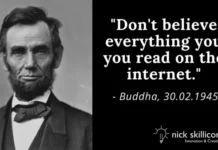
Every third person in the world is bemoaning the demise of good journalism, quality content and responsible reporting. The rise of so-called click-bait, attention on revenue over productivity, and pressure to turn out quick-hitting stories at the cost of important, time-consuming pieces has disempowered journalists so much so, that they have stopped caring about whether they are doing justice to their jobs.
The Constructive Journalism Project (CJP) has come with a series of one-off workshops, enabling current and budding journalists to create inspiring stories and more balanced reporting by introducing them to the concept of constructive journalism. Through workshops being delivered at universities across the UK, CJP aims to teach journalism students how to approach news in a more solutions-oriented way. Seán Dagan Wood, co-founder of the project and editor-in-chief of Positive News, explains:
“Fundamentally, constructive journalism is about uniting a constructive, compassionate mindset with rigorous journalism. By applying journalistic skill to looking for potential solutions to problems that society faces, highlighting positive responses and innovation, it’s a way to frame things differently. This gives the journalist new angles on important issues, engages the audience and helps present a fuller picture of truth.
“Ultimately it’s a way of reporting that hopes to be more empowering. A very negative focus can lead the reader to feel hopeless, cynical and disempowered. But with the constructive approach the idea is that by seeing a fuller picture that includes the potential avenues for positive change, people can feel more able to make informed decisions and see more possibilities for how they might respond, in thinking or in action, to the things that matter to them.”
Need a break from brexit? Listen to @JodieJackson of @c_journalism on psychological benefits of constructive news https://t.co/eZb0wnnUt3
— Constructive Voices (@ConstructiveVox) July 20, 2016
Pursuing what is usually seen as good journalism — which can often be hypercritical and negative — means we end up shooting ourselves in the foot as readers can be turned away, says Wood, adding since more and more media organizations begin to explore new ways to keep committed readerships, people are increasingly open to constructive journalism. He told journalism.co.uk:
“While holding power to account and highlighting corruption are essential parts of journalism, a constructive approach means looking at building on these stories and addressing them in a more balanced way, for example showing what’s being done about the problem…
“[Social media] is empowering a lot of new voices, a lot of new publishers and platforms, and I think what that’s doing is showing both people working in the industry and the public that there are multiple narratives.”
Even the Guardian is starting to take #constructivejournalism seriously. That’s what we like to see at @c_journalism https://t.co/560Xyz5P7Q
— Danielle Batist (@daniellebatist) August 2, 2016
Course leader Danielle Batist, who is a co-founder of the project and a freelance journalist, says the team’s constructive journalism courses are focused on breaking down assumptions as well as aid journalists and editors to report on issues in a more constructive way:
“[Some institutions] have been teaching the same thing for years and don’t want to change. They teach the five Ws of what journalists should include in stories (who, what, where, why and when), but we think there should be a sixth W: ‘what now?’ looking at what’s being done to fix the problems we report on.
“In journalistic culture there are assumptions about what news is and what journalism should focus on, which need to be questioned if we are to continue to innovate the craft and best serve our audiences. It’s certainly not about doing away with any of the really important approaches to reporting that we already have; but the constructive approach can add another element to the journalist’s tool-kit and help strengthen their reporting.”
The CJP began running paid-for courses in the UK aimed at freelance journalists in November 2014. However, it began the two-to-three hour workshops — which explore story angles, the way issues are approached and questions are asked, as well as offer advice on how to fund constructive journalism projects and where to pitch them — free of charge for the universities across the UK and worldwide in February 2015.
This article (UK Universities Equipping Students With Skills To Practice Constructive Journalism) is a free and open source. You have permission to republish this article under a Creative Commons license with attribution to the author and AnonHQ.com.




